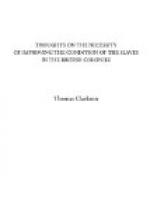One word or two now on another part of the subject. A great noise will be made, no doubt, when the question of Emancipation comes to be agitated, about the immense property at stake, I mean the property of the Planters;—and others connected with them. This is all well. Their interests ought undoubtedly to be attended to. But I hope and trust, that, if property is to be attended to on one side of the question, it will be equally attended to on the other. This is but common justice. If you put into one scale the gold and jewels of the Planters, you are bound to put into the other the liberty of 800,000 of the African race; for every man’s liberty is his own property by the laws of Nature, Reason, Justice, and Religion? and, if it be not so with our West Indian Slaves, it is only because they have been, and continue to be, deprived of it by force. And here let us consider for a moment which of these two different sorts of property is of the greatest value. Let us suppose an English gentleman to be seized by ruffians on the banks of the Thames (and why not a gentleman when African princes have been so served?) and hurried away to a land (and Algiers is such a land, for instance), where white persons are held as Slaves. Now this gentleman has not been used to severe labour (neither has the African in his own country); and being therefore unable, though he does his best, to please his master, he is roused to further exertion by the whip. Perhaps he takes this treatment indignantly. This only secures him a severer punishment. I say nothing of his being badly fed, or lodged, or clothed. If he should have a wife and daughters with him, how much more cruel would be his fate! to see the tender skins of these lacerated by the whip! to see them torn from him, with a knowledge, that they are going to be compelled to submit to the lust of an overseer! and no redress. “How long,” says he, “is this frightful system, which tears my body in pieces and excruciates my soul, which kills me by inches, and which involves my family in unspeakable misery and unmerited disgrace, to continue?”—“For ever,” replies a voice Suddenly: “for ever, as relates to your own life, and the life of your wife and daughters, and that of all their posterity,” Now would not this gentleman give all that he had left behind him in England, and all that he had in the world besides, and all that he had in prospect and expectancy, to get out of this wretched state, though he foresaw that on his return to his own country he would be obliged to beg his bread for the remainder of his life? I am sure he would. I am sure he would instantly prefer his liberty to his gold. There would not be the hesitation of a moment as to the choice he would make. I hope, then, that if the argument of property should he urged on one side of the question, the argument of property (liberty) will not be overlooked on the other, but that they will be fairly weighed, the one against the other, and that an allowance will be made as the scale shall preponderate on either side.




